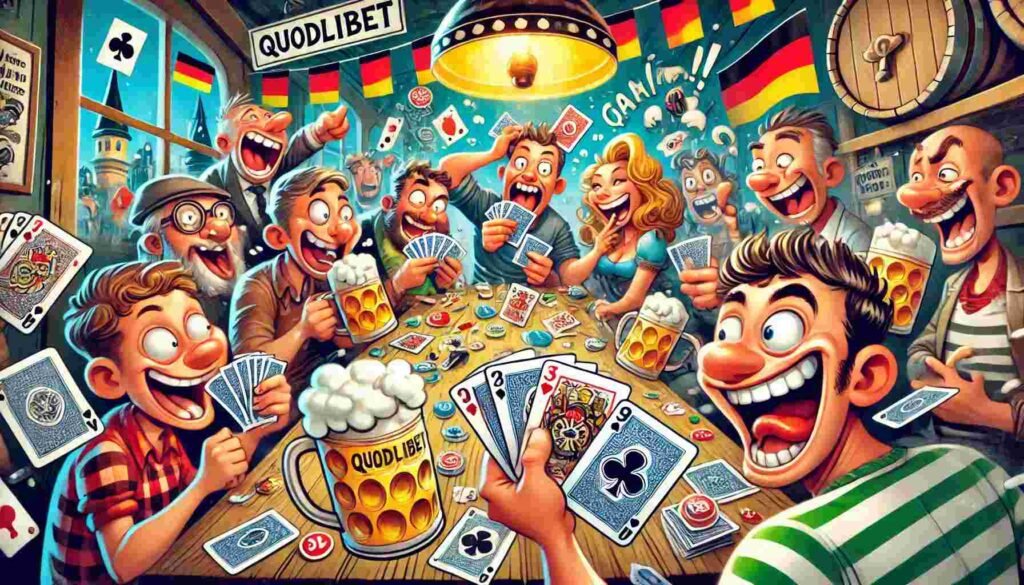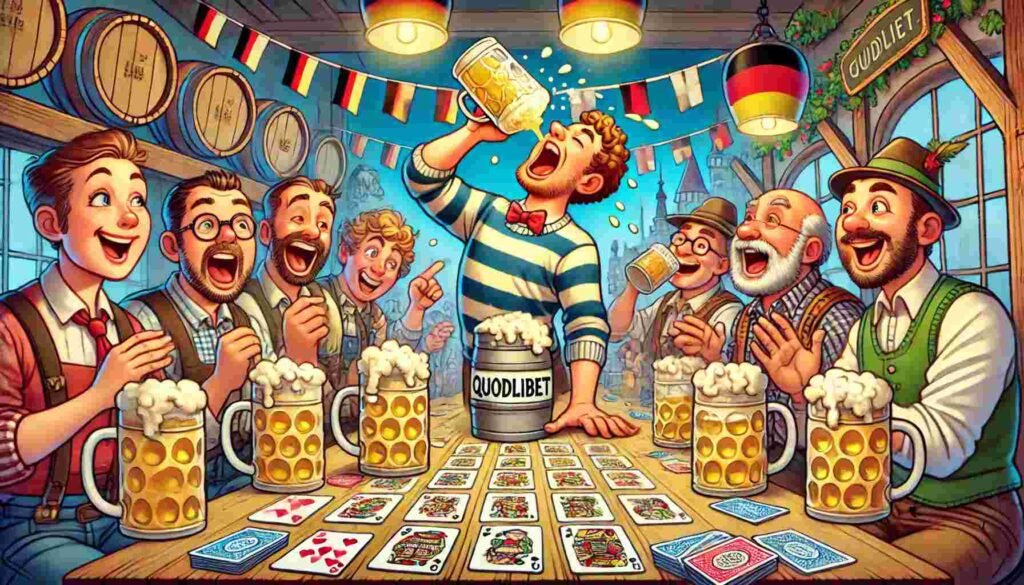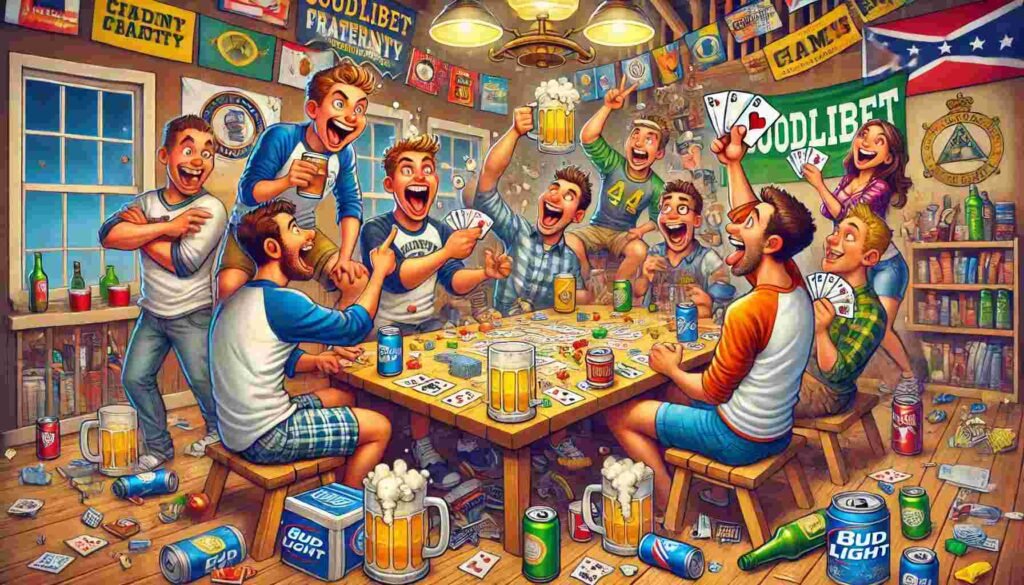Ever heard of a card game that dates back centuries, but is still played to this day? Welcome to Quodlibet! If you’re looking for a game that brings the old-world charm of trick-taking card games together with the high spirits of a drinking game, Quodlibet might just become your new favorite.
Table of Contents
What is Quodlibet?
Quodlibet, meaning “whatever you wish” in Latin, is a traditional card game that traces its roots to the student fraternities of central Europe, particularly in Austria and Germany. The game has been played for centuries, and its structure remains largely unchanged – a testament to its timeless appeal. What makes Quodlibet stand out is its use of the William Tell pattern cards, a type of deck filled with symbols and artwork reminiscent of the game’s deep cultural roots.
Originally, the game was a purely competitive trick-taking card game, where players competed to win the most rounds. However, over time, it became much more than that. As it spread through student fraternities, it turned into a drinking game – adding a fun and boozy twist to an already entertaining card game.

How to Play Quodlibet Card Game
Objective:
The goal is to score the fewest penalty points by the end of the game. This is a trick-taking card game with no trump suit, where players follow the suit but aren’t required to win tricks unless specified by the contract.
Setup and Deal:
- Number of Players: 4 players
- Number of Cards: 32 cards from a William Tell deck (a German-suited deck).
- The dealer, known as the “beer king”, deals 8 cards to each player (3-3-2 or 3-2-3).
- The beer king picks the first contract from a set of available contracts for the round.
- Quodlibet is played anti-clockwise, with the player on the dealer’s right leading the first trick.
- Players follow suit when possible, and the game continues over 12 deals divided into three rounds.
Contracts
Each round has a different set of contracts that dictate how tricks are scored.
First Round Contracts:
- Plus
Players try to win as many tricks as possible. Each trick won subtracts 10 points from their score. But if a player wins no tricks, they receive a penalty of 100 points. - Minus
In this contract, players aim to win as few tricks as possible. Every trick won adds 10 points to their score. If a player captures all tricks, they suffer a penalty of 100 points. - Bad Neighbor
Players try to win as many tricks as possible, but the twist is that any points earned are added to the score of the player on their left. It’s all about being a “bad neighbor” and adding to your opponent’s score. - Red Ruffians
In this contract, the player who captures the King of Hearts adds 50 points to their score. If they capture the Queen of Diamonds, they add 30 points. If both the King and Queen are captured in the same trick, that player earns a hefty 100-point penalty.
Second Round Contracts:
- First Three and Last
Points are given for capturing the first three and the last trick. The player who captures the first trick adds 10 points, the second trick adds 20 points, the third adds 30, and the last trick adds 50 points to their score. - No Hearts
Players must avoid capturing any Hearts. The 7-10 of Hearts adds 20 points to the score, and the J-A of Hearts adds 10 points each. If a player captures a trick containing only Hearts, they receive 100 points. - Queens & Jacks
Players aim to avoid capturing any Queens or Jacks. Each Queen adds 30 points, and each Jack adds 20 points. Capturing a Queen and Jack in the same trick adds 100 points to the player’s score. - Bribe
Every trick adds 30 points to the player’s score. The player who plays the lowest card in a trick scores 20 points. If the lowest card wins the trick, the player earns 100 points.
Third Round Contracts:
- Open Trousers
Players hold their cards facing outward, so they cannot see their own hand, but opponents can. Players don’t need to follow suit. For every trick they win, they lose 10 points, but if they win all tricks, they add 100 points to their score. - Good Hunting
Players place their hands face-up on the table. Each trick captured adds 10 points to the player’s score, but capturing all eight tricks earns them a 100-point penalty. - Quadrature
Players try to capture the fourth and eighth tricks of the hand. Capturing the fourth trick subtracts 40 points from their score, while capturing the eighth trick subtracts 80 points. - Snack
In this contract, players aim to build rows of cards by starting with Jacks and playing cards in suit order. If a player cannot play, they must pick up a pile of cards from the table. The first player to get rid of all their cards ends the round, and any remaining cards in hand add 10 points each to the player’s score. The last player to go out receives a 30-point penalty per card left.
Winning the Game:
At the end of all 12 deals (three rounds), the player with the fewest penalty points is declared the winner.
Quodlibet Drinking Game Rules
Adding drinking rules to Quodlibet transforms the game from a test of skill to a hilariously fun party game. Here are some basic drinking rules to get you started.
General Drinking Rules
- Trick Penalty Drinks:
In any contract, if a player wins or loses a trick, depending on the contract rules, they must take a sip for each trick won/lost. For example, in the Plus contract, for every trick a player does not win, they must take one sip. In the Minus contract, every trick they win makes them take a sip. - Penalty Points Shot Rule:
For every 50 penalty points accumulated during the game, the player must take a shot. This ensures that the player who’s lagging behind the most has to drink the most. - Beer King’s Command:
The Beer King (dealer) has a special privilege! At any point during their reign, they can assign drinks to anyone at the table (max 3 sips per command). Beware: this can be a great tool for revenge if someone keeps sticking you with penalty points.
Wild Cards Drinking Add-ons
- Joker’s Rule (Optional Wild Card):
If you’re using a Joker as a wild card, every time it’s played, the player must take two sips and make a ridiculous rule for the rest of the round. The rule could be anything from “everyone drinks with their left hand” to “no talking allowed.” - Shuffle Punishment:
If the deck needs to be reshuffled before the game ends, everyone takes a shot! - Spill and Sip:
If anyone spills their drink during the game, they immediately have to take three sips as a penalty.
End of Game:
- Loser’s Shot:
The player with the most penalty points at the end of the game must take a shot to drown their sorrows. - Winner’s Reward:
The player with the fewest penalty points can choose anyone at the table to take a shot, as their reward for winning.
Best Drink Pairings for Quodlibet
Why settle for plain old beer when you can elevate your Quodlibet drinking game with creative drink pairings? Whether you want to match the European roots of the game or just keep things interesting, choosing the right drink for each round can set the perfect mood.
Plus Contract Pairing – Light Beers
For the Plus contract, where players aim to win as many tricks as possible, a light, easy-drinking beer like a pilsner or lager is the way to go. It’s refreshing enough to handle multiple sips as you rack up the tricks, but not so heavy that you’re down for the count after a few rounds. Try a classic German pilsner to keep the theme going.
Minus Contract Pairing – Wine
In the Minus contract, you’re aiming to lose tricks. Pair this round with a nice glass of wine, which gives the game a more refined vibe. Whether it’s a rich red or a crisp white, wine slows the pace of drinking and adds a bit of class to the chaos.
Bad Neighbor Contract Pairing – Shots of Schnapps
Since you’ll be passing penalty points to the player next to you in the Bad Neighbor contract, bring out the schnapps (preferably Austrian or German for authenticity). Every time you score against your opponent, take a small celebratory sip. Schnapps keeps things light but adds a sharp kick to the game.
Alarich Contract Pairing – Dark Beers or Stouts
When dealing with high-penalty cards like the King of Hearts or the Ober of Bells, it’s time for something heavier: a dark beer or stout. The rich flavors complement the suspense of avoiding these high-stakes cards. The darker the beer, the more intense the game feels, making this round a fan-favorite for experienced drinkers.
Bonus – Non-Alcoholic Pairings
For those who want to enjoy the game without the alcohol, try pairing each round with craft sodas or mocktails. A root beer or ginger beer can give you the same rich, bold flavors without the booze, keeping everyone included in the fun.
The Best Card Games for Drinking
Quodlibet isn’t the only card game out there that pairs well with a cold drink in hand. Here are some other traditional trick-taking card games that are perfect for drinking:
- Bierskat – Another classic drinking game from Germany, similar to Quodlibet, where beer plays a central role.
- Elfern – A fast-paced drinking game that involves matching cards to a set of specific criteria, with drinks being handed out whenever someone slips up.
- Ring of Fire – A hugely popular drinking game where each card in the deck has a different rule, making every turn unpredictable (and often hilarious).
These games, like Quodlibet, combine the fun of competition with the thrill of adding drinking penalties for a more interactive experience.

DIY Quodlibet: Make Your Own Custom Cards and Drinking Rules
Want to take your Quodlibet drinking game to the next level? How about creating your own custom set of cards and house rules? This way, you can make sure the game fits your group’s unique style (and humor). Here’s how to personalize your Quodlibet experience.
Create Your Own Quodlibet Cards
You don’t need to be a professional artist to design a custom set of Quodlibet cards. Whether you print them out from a template or use an online tool like Canva, you can design your deck with unique graphics and themes that reflect your group’s vibe. Try creating cards with inside jokes, funny illustrations, or even photos of the players themselves to add a personal touch.
Add New Drinking Rules for Chaos
Here’s the fun part: make up your own house rules! These can be as creative, wild, or ridiculous as you want. Some ideas:
- “Shot Caller”: The player who wins the most tricks in a round becomes the “Shot Caller” and can make anyone take a shot at any time in the next round.
- “Bard of the Table”: Every time a player wins a trick, they must recite a short (and silly) poem. The player who laughs the most takes a drink.
- “Switched Hands”: For one round, everyone has to play with their non-dominant hand. Every time someone messes up, they drink!
Introduce Custom Challenges
Want even more madness? Add custom challenges to your game. Before every round, have players draw from a deck of “challenge cards” that add crazy tasks like:
- Play a round blindfolded.
- Speak in a pirate accent for the next deal.
- Take a shot before you play your next card.
These challenges will keep everyone on their toes (and laughing out loud).

Alternative Quodlibet Variations for Larger Groups
Playing Quodlibet with just 4 people is classic, but what if you’ve got a larger group itching to join in? No problem! Here are some simple ways to adapt the game to accommodate more players without losing any of the fun.
Team Quodlibet
Instead of playing solo, divide your group into teams of 2. Each team shares a hand, and players take turns playing cards during each round. This makes the game more strategic, as teammates can communicate and plot their moves together. To keep things fair, rotate the teams each round so everyone gets a chance to play with different partners.
Multiple Decks, Multiple Players
If you’ve got 6 or more players, try adding a second deck of cards. This allows for more cards per round and increases the complexity of the game. The same contracts apply, but the added cards create more opportunities for trick-taking, making the game wilder as it progresses.
Quodlibet Tournament
For really large groups, set up a Quodlibet tournament. Divide the players into tables of 4 and run multiple games simultaneously. After each round, the winners move on to the next table, while the losers face off against each other. Crown the winner of the entire tournament as the Ultimate Beer King, with bragging rights (and maybe a drink on the house).
FAQs for Quodlibet Drinking Game
What is Quodlibet?
Quodlibet is a classic trick-taking card game with origins in German and Austrian student fraternities. It’s played with a 32-card deck, and the goal is to score the fewest penalty points by the end of the game. But here’s the twist: over time, it evolved into a wild drinking game, where penalty points often lead to drinks and laughter.
How do you pronounce “Quodlibet”?
It’s pronounced “kwod-li-bet”—and after a few rounds of drinks, it may just come out as “whatever!”
How many people can play Quodlibet?
Quodlibet is designed for 4 players, but you can adapt it for larger groups by creating teams or running multiple tables in a tournament format. The more, the merrier (and probably tipsier)!
What’s the “Beer King” in Quodlibet?
The Beer King is the dealer who not only deals the cards but also picks the first contract for the round. As the reigning monarch, the Beer King also has the power to assign drinks and dish out punishment (for drinking, of course!).
What are the most fun drinking rules for Quodlibet?
The possibilities are endless, but some crowd favorites include:
1. Trick Penalty Drinks: Sip for each trick you win/lose, depending on the contract.
2. Penalty Points Shots: Every 50 penalty points? Take a shot!
3. Beer King’s Command: The Beer King can assign drinks to anyone at any time.
For a more chaotic experience, throw in wild card drinking rules like the Joker’s Rule, where playing a Joker forces you to make up a silly rule for the round.
How long does a game of Quodlibet take?
The game consists of 12 deals spread over 3 rounds, so it usually takes about 1-2 hours, depending on how fast (or slow) everyone plays—especially once the drinks start flowing.
Can I play Quodlibet with a regular deck of cards?
Yes! If you don’t have a German-suited deck, simply remove the 2s through 6s from a regular deck, leaving you with the 7s through Aces. You’ll have all the cards you need to play.
How much drinking is involved in Quodlibet?
How much you drink depends on how ruthless the other players are! The game can be played with casual sipping or full-on chugging, depending on the drinking rules you adopt. Just be sure to pace yourself and remember it’s all in good fun.
Is Quodlibet more about skill or luck?
It’s a mix of both. There’s plenty of strategy involved in choosing the right cards and contracts, but with the added drinking rules, luck (or lack thereof) plays a big role in how quickly things spiral into hilarious chaos.
What’s the best drink to pair with Quodlibet?
It depends on your vibe! Light beers work well for a long game, while schnapps or wine add a more European twist. If you’re feeling bold, throw in some stouts or cocktails for high-penalty contracts. For non-drinkers, craft sodas or mocktails fit perfectly.
